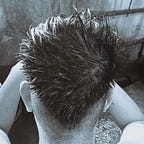Discovering the Meaning of ‘Kafkaesque’
Kafka — may or may not be for the claustrophobic
According to Thomas Mann, Hermann Hesse once called Franz Kafka “the uncrowned king of German prose.” (What a gossip). That was before Kafka was famous. Safe to say that in their time, he was
Franz the
Up-and-
Coming
Kafka
It’s my goal to, at least once in my life, use the term ‘kafkaesque’ because I feel like it’ll make me sound 1000x smarter, but I can’t use it if I don’t get it.
Man, was I glad when I saw a cheap used copy of Kafka’s short stories. Prior to reading the collection, I’d only read “The Metamorphosis” and “A Hunger Artist” — not enough to get the whole idea. So when the book arrived I immediately read the first story “The Judgment” and what kind of madness was that? Very quickly, it went from calm to hysterical. Then when I went back to read the introduction of this collection, I sensed that there’ll be no joy in the book.
Yeah, there wasn’t much joy but there was dark humor.
I spent a week immersing myself in the stories that are so diverse from each other but there’s that one theme, one feeling, that holds them together. I think it’s easy to notice the kafkaesque theme when one is claustrophobic. In every story, I found myself out of breath not because of the beautiful writing but because of the feeling of entrapment. My conclusion isn’t new because the alienation theme of Kafka’s work has been said over and over already. But think about what makes one alienated. Isn’t alien synonymous with the unknown? And when you’re alienated, won’t you feel out of place? Or misunderstood by the people around you?
Further, I noticed three things that are ever-present in a Kafka story. the alienated being, the place, and the observers.
Like in “The Metamorphosis”: Gregor Samsa, the insect, is the alien. What makes him alienated is the inability to communicate because of his metamorphosed form. He and the (stinky) room he occupies deteriorates the longer he stays. The deterioration becomes so vividly picturesque which makes the place a significant part of the kafkaesque scene. It shows the state of abandonment. Even when the room is occupied, it mirrors the discarded feeling of the occupant. Then, add the observers to the mix: his family who learned to do without him. Misunderstood, not needed, and trapped in another form, Gregor the insect is in for a major existential crisis.
The same goes for the ape in “A Report to the Academy.” Science taught him to speak and act like a human but man’s freedom isn’t the same as his. So he wanted to bail out of this polluted world.
“No freedom was not what I wanted. Only a way out: right or left, or in any direction.”
In “Investigations of a Dog,” the dog’s superior childhood (puppyhood?) inquiries were dismissed by the dogdom that was not as curious as him. The dogdom, instead of asking, just accepted what was and obeyed what must.
“I must go; you must hunt, nothing but musts! Can you explain to me why we must?”
Therefore Kafkaesque, for me, may describe either a place that traps one without hope of an escape. Or a mere feeling of imprisonment without a way out. When one is averse to the place they are in, all they see is its deterioration. And when one has an enduring feeling that they don’t belong, the existential dilemma is inevitably next.
There’s something paralyzing with the idea of not being able to communicate. Ah, to be understood!
I’m not sure if I want to use kafkaesque in a sentence anymore.
From Books are Better Than Food’s Booktube (lingo for book-Youtube), I learned that Kafka instructed that all of his manuscripts be burned. But he gave it to a friend who he knew would not follow.
Franz the up-and-comer is now Franz the Utterly Confused Kafka.
What a guy.
But you know what, I may be wrong. I haven’t read the unanimously recommended The Trial, so I don’t know if it follows the pattern. But this is what we have learned so far.
Whenever you’re feeling kafkaesque, remember that we always have books as a getaway.
Now, breathe.
PS. This story is first published on Instagram. You read it right, Instagram! If there’s BookTube, there should also be Bookstagram. I’m @byssheplease_
